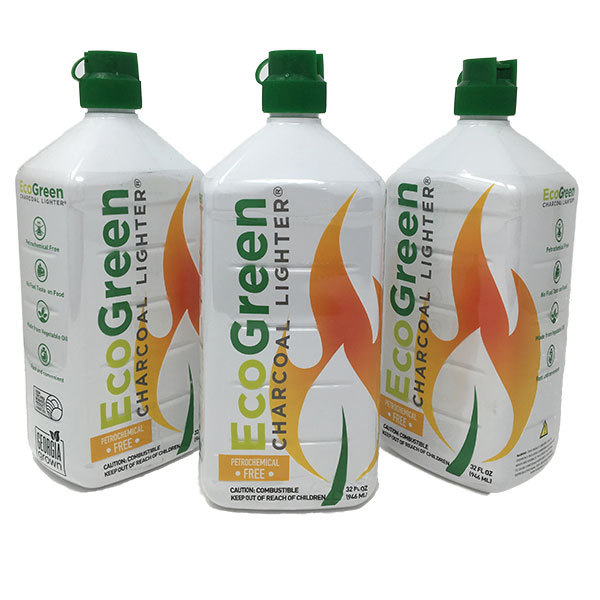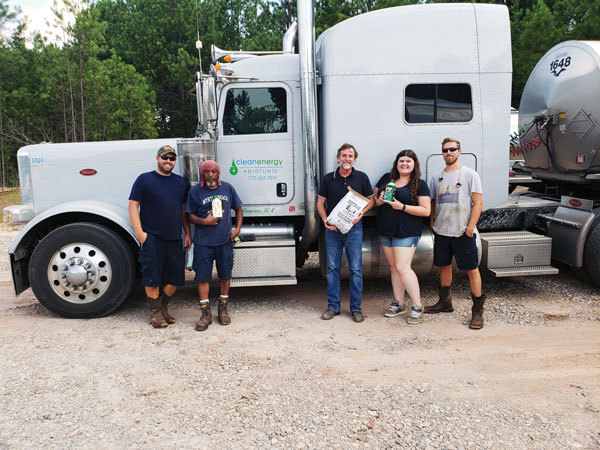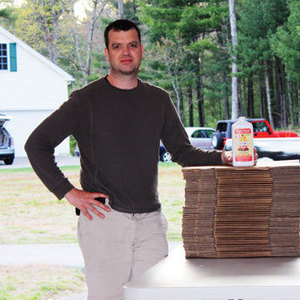Biodiesel Firestarter




PHOTO: ESCOGO
August 13, 2018
BY Ron Kotrba
Not every day does a man trying to please his family end up launching a highly successful business as a result. But then again, most clichéd garage startup companies don’t see their product on the shelves of 20,000 stores nationwide either. This is the classic American dream story spiked with a familiar twist of biodiesel industry innovation. And it all started with 2 pounds of chicken.
“I like grilling, and my family likes my grilling,” says Marcus Smith, entrepreneur and inventor. “I lit the charcoal with petroleum lighter fluid, like I always did, and barbequed the meat. After one bite my wife said, ‘This tastes like gasoline,’ and dumped it in the trash—2 pounds of chicken wasted. That got the ball rolling.”
Smith says in the late 2000s, nonpetroleum lighter fluid couldn’t be found on store shelves. “I thought, ‘That’s crazy,’” he says. “I started messing around with chemistries on my own—combinations of different oils and ingredients. But this was out of my element, so I hired a chemical engineer, which was a huge benefit. Then I came across biodiesel as a component of the formula—it was cost-effective and worked well.”
The work began as a hobby job, since Smith was employed full time. “My family and I were making deliveries in the early mornings and on the weekends,” he says. “I never really knew what to make of it.” Farm stands and local stores in New England, where Smith lived, were buying his natural lighter fluid—which Smith aptly named Smarter Starter Fluid.
In 2009, Smith got the product into Whole Foods. “I sat down with a buyer at a local store, we talked about my concept and he asked questions about price point, packaging and design,” he says. “Back then you could sell to individual Whole Foods stores. I was a pain in the neck. When you’re launching a product, you have to sell something before you have it.” Smith says that this particular buyer was instrumental in shaping the product and helping him understand price sensitivity. From that one location, Smith was able to leverage all 23 Whole Foods stores in New England. “I might as well have pasted a dollar on every bottle when I factored in my time and delivery costs,” he says. “But the goal was to pioneer a brand and place it on the shelf.”
From there, Smarter Starter Fluid grew into national distribution. “At that point, I had to make a choice,” Smith says, “on what the direction of the company would be.” Struggling to make a profit, Smith wondered how to reduce input costs. Rather than buying biodiesel at retail or wholesale costs at best, he considered several options: installing processing equipment and making biodiesel himself; raising more money; or reaching out to established biodiesel manufacturers and presenting the product, along with the commercial value of diversifying their product portfolio, to them.
“I contacted five biodiesel companies—big ones, small ones, and medium-sized ones,” Smith says. One of those “medium-sized ones” was Down to Earth Energy, doing business as Clean Energy Biofuels. “We had been dabbling in the chemicals side of methyl esters and we got a call from this guy, Marcus Smith, who literally set up a business in his garage in 2009 to develop an all-natural lighter fluid for charcoal—one of the elements of which was methyl esters,” says Rick Huszagh, manager and co-founder of Down to Earth Energy. Huszagh’s operation is a 2 MMgy biodiesel production facility in Monroe, Georgia, which began in 2008. “Marcus needed to get vertically integrated with a manufacturing facility. He visited several other biodiesel companies but they didn’t want to get involved—it was too small-scale for them. I said, ‘This makes sense,’ so we set up another company, brought in another partner to get us the cash we needed to get our bottling lines established, and in 2013 we launched the company.”
They named the new venture “Escogo,” which stands for “ester consumer goods.” Huszagh says matter-of-factly, “That’s what we’re selling.”
In 2014, the team presented to Home Depot whose Atlanta headquarters is “right in our backyard, just 50 miles away,” Huszagh says. “The buyer came in and gave us 30 minutes. An hour later, he handed us a vendor packet and put us in all the Atlanta stores. That was unheard of. We thought, ‘Well, that was easy!’ Two months later, the buyer said he wanted to roll us out to Home Depot’s Los Angeles and Washington, D.C., stores. Then nearly a year later, on Sept. 9—and I remember the day because it is my birthday—he said he wanted to roll us out to all the Home Depot stores. That was exciting.”
Smith says, “To his credit, Rick is the only one who got it, who saw the potential and was willing to take a risk. He is an extremely persistent, determined individual. I got that feeling the first time we met when I toured his plant. He knew everything about his equipment and process, and I knew this was the partner I wanted.”
The pure-play biodiesel business is cutthroat and not for the faint of heart. “As a small producer, it’s been really tough,” Huszagh says. “You’re seeing a lot of these plants get liquidated, and if they haven’t developed an oil collection model, they can’t survive without economies of scale.” Clean Energy Biofuels grew its collection business from the ground up and moved beyond just restaurant collections to include industrial clients. Its biodiesel distribution business tackled obstacles by selling blended product to trucking distribution centers of big-name companies. “We lease land on the distribution center lot, we crane in a 12,000-gallon double-walled tank and drop a card reader on it,” Huszagh says. “The fleets give cards to drivers who can fill up on site and we monitor the level remotely, so when it’s low, we truck in another load. It’s good in that a lot of these distribution centers would rather fuel on-site because it gives them more control rather than having a driver go to a truck stop where they might be there for an hour. They’re also getting better pricing from us too. Right now, at truck stops, sometimes you don’t know what you’re getting. We provide them B5 to B20.”
While the biodiesel business has been tough, Huszagh says the long-term relationships his company has built with its customers has allowed him to continue producing biodiesel and selling into the transportation market. “It’s sort of a break-even proposition, and if the dollar comes back—well, that’s what we’re waiting on,” he says. “Also, our fleet is using a fair amount of fuel, so we’re diversified in that respect.”
By being diversified, it has become possible for Huszagh to navigate the biodiesel storm of political uncertainty, RIN manipulations and the yearly vanishing act of the tax credit. “This biodiesel thing is a sickness, an addiction,” Huszagh tells Biodiesel Magazine. “It doesn’t make any sense, but I don’t think Clean Energy Biofuels will ever get to the point of not making biodiesel for transportation, but the less exposure we have on that, the better off we are long-term. Going into alternative chemicals production has given us the stability we needed as a company and has allowed us to grow. If I go to the bank as a biodiesel company, it’s very hard to get equity credit lines or working capital. They ask the same questions as everyone else—‘What’s the history on RINs and the dollar tax credit?’ But now, the banks give us good rates and lines of credit. That was the key reason we had to diversify.”
Huszagh says the goal is to divert more than 25 percent of the biodiesel plant’s production flow into chemical use in 2019. “We’re on track to do that,” he says.
Smith has been selling Smarter Starter Fluid since 2009. “That product is more intended for lump charcoal, not briquettes,” Smith says. “We recently launched our new EcoGreen formula for briquettes, which is patent-pending.” With its briquettes application, EcoGreen appeals more to the mass market than to the “sprouts” type of organic shopper. “That’s how we segmented into two formulas,” Smith says.
Escogo’s innovation doesn’t stop at a second, mass-market friendly biodiesel-based lighter fluid. The company is also marketing an all-natural drip-torch fuel. Drip torches are used for controlled burns, and the fuel is typically a mix of diesel fuel and gasoline. “About 10 percent of that doesn’t combust and it gets into the soil,” Huszagh says. “So we’re offering an alternative to that, and we’ve sold quite a lot of it.”
Another product that Escogo is coming out with soon also ties into the barbeque market. It’s called Moonshine Charcoal, a match-ready briquette, and it is expected to launch in October. “The lighter fluid market is only a $150 million market, but the briquette market is huge,” Huszagh says. “We recently teamed up with one of the largest charcoal makers in the U.S.” He adds that Moonshine Charcoal will soon be offered in one of the largest retail chains in the world. “We’re selling bulk for this,” Huszagh says. “We’re going from sending out cases of lighter fluid to moving 6,000-gallon tanker loads.”
The team at Escogo has several other early-stage, biobased products in the works to ultimately curb petroleum use in consumer goods. At the heart of this determination, according to Huszagh, is the environment and the issue of climate change. “That’s the single biggest driver,” he says. “It’s a real issue. We didn’t think it would go dormant, and we know over time awareness will increase.” Looking back on his success, Smith says, “The retail environment is fiercely competitive, so the fact that a small company like ours has gotten as far as we have—fighting those enormous challenges and headwinds—is a testament to my and Rick’s determination in making it happen. We have had tremendous setbacks—and wins—over the years. But Rick is a soldier. He’ll plow through a brick wall, good or bad. He’s a diesel engine.”
Author: Ron Kotrba
Editor, Biodiesel Magazine
218-745-8347
rkotrba@bbiinternational.com
Advertisement
Advertisement
Advertisement
Advertisement
Related Stories
CoBank’s latest quarterly research report, released July 10, highlights current uncertainty around the implementation of three biofuel policies, RFS RVOs, small refinery exemptions (SREs) and the 45Z clean fuels production tax credit.
The U.S. Energy Information Administration maintained its forecast for 2025 and 2026 biodiesel, renewable diesel and sustainable aviation fuel (SAF) production in its latest Short-Term Energy Outlook, released July 8.
XCF Global Inc. on July 10 shared its strategic plan to invest close to $1 billion in developing a network of SAF production facilities, expanding its U.S. footprint, and advancing its international growth strategy.
U.S. fuel ethanol capacity fell slightly in April, while biodiesel and renewable diesel capacity held steady, according to data released by the U.S. EIA on June 30. Feedstock consumption was down when compared to the previous month.
XCF Global Inc. on July 8 provided a production update on its flagship New Rise Reno facility, underscoring that the plant has successfully produced SAF, renewable diesel, and renewable naphtha during its initial ramp-up.
Upcoming Events










